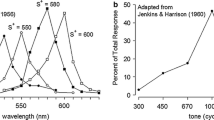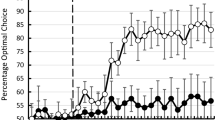Abstract
In 2 experiments pigeons were trained on a fixed-interval schedule with multiple SΔ periods and on 2 different DRL schedules, under 2 different conditions of bodily restraint. After behavior had stabilized, changes in the degree of restraint in either direction produced major transient disruption of the behavior and small steady-state differences. These results are consistent with the idea that interim and terminal responses on such schedules are mutually inhibitory, so that preventing the one facilitates the other.
Similar content being viewed by others
References
ANGER, D. 1956. The dependence of interresponse times upon the relative reinforcement of different interresponse times. Journal of Experimental Psychology, 52, 145–161.
DEWS, P. B. 1962. The effect of multiple Sa periods on responding on a fixed-interval schedule. Journal of the Experimental Analysis of Behavior, 5, 369–374.
GLAZER, H., & SINGH D. 1971. Role of collateral behavior in temporal discrimination performance and learning in rats. Journal of Experimental Psychology, 91, 78–84.
HARZEM, P. 1969. Temporal discrimination. In R. M. Gilbert & N. S. Sutherland (Eds.), Animal discrimination learning. London: Academic Press. Pp. 299–334.
HENDRY, D. P., & DILLOW, P. V. 1966. Observing behavior during interval schedules. Journal of the Experimental Analysis of Behavior, 9, 337–349.
HODOS, W., ROSS, G. S., & BRADY, J. 1962. Complex response patterns during temporally spaced responding. Journal of the Experimental Analysis of Behavior, 5, 473–479.
KELLEHER, R. T., FRY, W., & COOK, L. 1959. Interresponse time distribution as a function of differential reinforcement of temporally spaced responses. Journal of the Experimental Analysis of Behavior, 2, 91–106.
KRAMER, T. J., & RILLING, M. 1970. Differential reinforcement of low rates: A selective critique. Psychological Bulletin, 74, 225–254.
LATIES, V. G., WEISS, B., CLARK, R. L., & REYNOLDS, M. D. 1965. Overt ‘mediating’ behavior during temporally spaced responding. Journal of the Experimental Analysis of Behavior, 8, 107–116.
NEVIN, J. A., & BERRYMAN, R. 1963. A note on chaining and temporal discrimination. Journal of the Experimental Analysis of Behavior, 6, 109–113.
REYNOLDS, G. S., & CATANIA, A. C. 1962. Temporal discrimination in pigeons. Science, 135, 314–315.
STADDON, J. E. R. 1972. Temporal control and the theory of reinforcement schedules. In R. M. Gilbert & J. R. Millenson (Eds.), Reinforcement: Behavioral analysis. New York: Academic Press.
STADDON, J. E. R., & SIMMELHAG, V. L. 1971. The “Superstition” experiment: A reexamination of its implications for the principles of adaptive behavior. Psychological Review, 78, 3–43.
TIMBERGEN, N. 1951. A Study of Instinct. London: Oxford University Press.
WILSON, M. P., & KELLER, F. S. 1953. On the selective reinforcement of spaced responses. Journal of Comparative and Physiological Psychology, 46, 190–193.
Author information
Authors and Affiliations
Additional information
Research supported by grants from the National Research Council of Canada to the University of Toronto, and grants from the National Science Foundation and the National Institute of Mental Health to Duke University.
Rights and permissions
About this article
Cite this article
Frank, J., Staddon, J.E.R. Effects of Restraint on Temporal Discrimination Behavior. Psychol Rec 24, 123–130 (1974). https://doi.org/10.1007/BF03394224
Published:
Issue Date:
DOI: https://doi.org/10.1007/BF03394224




